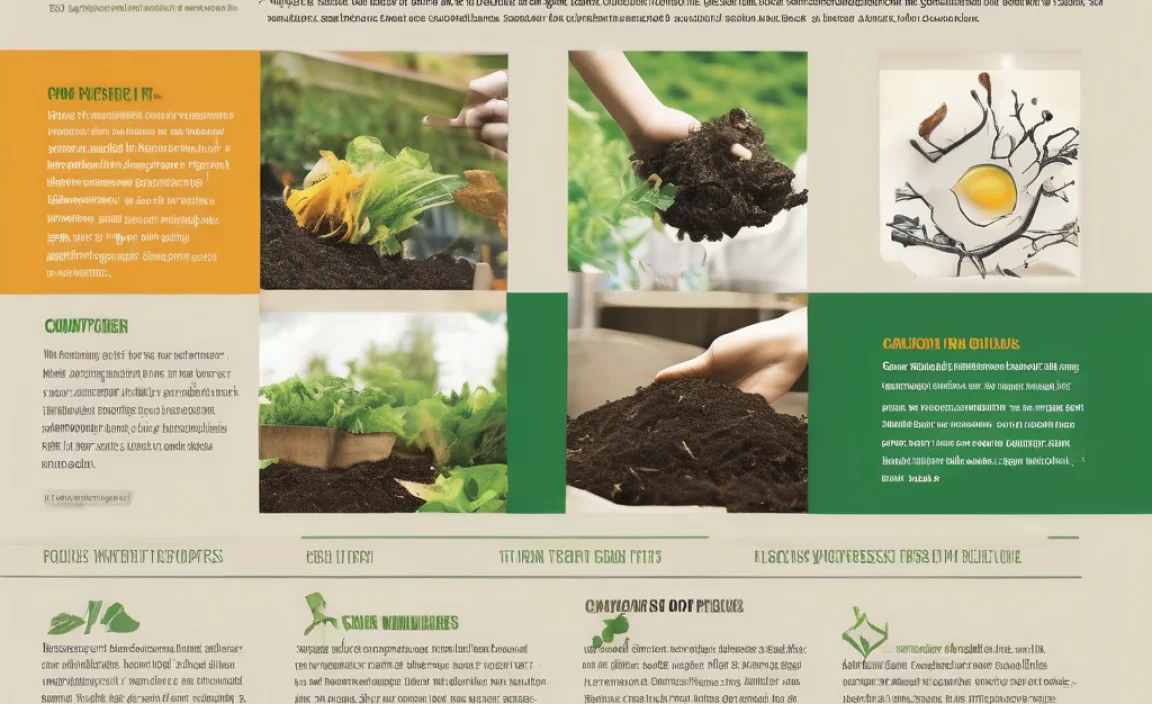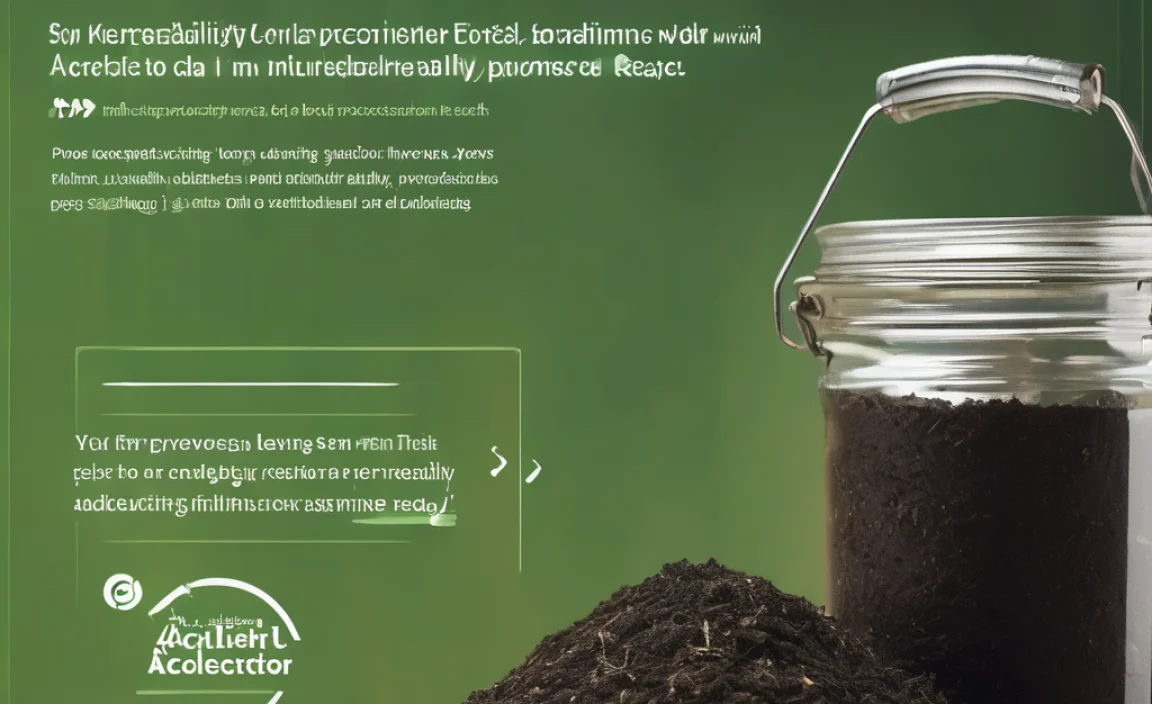Have you ever wondered how plants grow so well in compost? Compost acts like magic! It turns food scraps into rich soil. But there’s a secret to making great compost fertilizer. It’s all about the right temperature. Just like baking a cake, compost needs the perfect heat.
Imagine having a thermometer for your compost pile. You’d want to know when it’s too hot or too cold. Too hot and it might burn out. Too cold and nothing happens. Curious to learn more about compost fertilizer temperature? Let’s dig in!
Key Takeaways
- Compost temperature is crucial for breaking down materials.
- Ideal temperature ranges between 135°F and 160°F.
- Check temperature regularly for best results.
- Heat helps kill harmful bacteria in compost.
- Compost fertilizer temperature affects composting speed.
The Importance of Compost Fertilizer Temperature
Temperature plays a big role in composting. It helps break down organic materials. When the compost pile gets too cold, decomposition slows down. If it’s too hot, beneficial microbes might die. The perfect temperature is between 135°F and 160°F. This range allows microbes to break down materials efficiently. Plus, it helps kill bad germs that can harm plants.
- Heat speeds up decomposition.
- Microbes like warm temperatures.
- Too hot can harm compost quality.
- Cold composting takes more time.
- Proper heat kills weed seeds.
Monitoring your compost pile ensures it stays within the ideal temperature range. A compost thermometer is useful. It helps you know when to turn the pile. Turning aerates the compost and regulates heat. By maintaining the right temperature, you’ll have rich fertilizer faster.
Fun Fact or Stats : A well-managed compost pile can heat up to 160°F!
Why Temperature Matters in Composting
Does temperature really matter in composting? Yes, it does! Think of it like cooking soup. You need it warm enough to cook but not too hot to burn. Compost works the same way. The heat helps break down the waste. Without the right temperature, your compost pile might just sit there, doing nothing. So, keeping an eye on the heat is super important for turning scraps into rich soil.
How to Measure Compost Temperature
How do you know if your compost is at the right temperature? Use a special tool called a compost thermometer. It looks like a long stick with a dial on top. You stick it into the compost pile and read the dial. It’s easy and fun! Watching the needle move tells you if your compost is cooking just right. Remember, a happy compost pile makes happy plants.
Ideal Temperature for Composting
What’s the best temperature for composting? The ideal range is between 135°F and 160°F. It’s like a warm bath for microbes. They thrive in this heat and work faster. If the compost gets too hot, above 160°F, it can slow down. Keeping it just right is key to speedy composting.
How to Maintain Compost Fertilizer Temperature
Keeping your compost at the right temperature is like taking care of a pet. It needs attention and care. Start by checking your compost regularly. Make sure it’s moist but not soggy. Turning the compost helps too. It adds air and spreads the heat evenly. You might need to add more brown or green materials. Balance is important.
- Check temperature daily.
- Turn the pile regularly.
- Add water if too dry.
- Add dry materials if too wet.
- Balance green and brown materials.
If your compost turns cold, it might need more greens. If it’s too hot, let it cool before adding more. Proper care ensures the compost stays active and healthy. The right mix creates nutrient-rich soil for your garden.
Fun Fact or Stats : Did you know a steaming compost pile is a sign of good activity?
Balancing Greens and Browns
Why are greens and browns important in composting? They help keep the compost balanced. Greens like vegetable scraps add nitrogen. Browns like leaves add carbon. Both are needed for a perfect compost mix. Too much green can make it smelly. Too much brown can slow it down. A good mix keeps the temperature just right.
Turning the Pile
How often should you turn your compost pile? Every week is a good rule. Turning helps mix the materials. It adds air and keeps the temperature even. This helps the microbes stay active and happy. A well-turned pile breaks down faster and more efficiently.
Moisture and Compost Temperature
How does moisture affect compost temperature? Moisture is like a drink for your compost pile. It helps break down the materials. If the compost is too dry, it might stop working. Too wet, and it can get smelly. Keep it as moist as a wrung-out sponge for the best results.
Table of Compost Temperature Ranges
| Temperature Range (°F) | Compost Activity | Microbial Activity |
|---|---|---|
| 0-100°F | Slow | Low |
| 100-135°F | Moderate | Medium |
| 135-160°F | High | High |
| 160°F+ | Hot | Low |
Why Compost Fertilizer Temperature Changes
Compost temperature changes for many reasons. Sometimes it’s the weather. Cold weather can cool your compost. Hot weather can heat it. Other times, it’s the material inside the pile. As materials break down, they create heat. The balance of greens and browns also affects heat. Keeping an eye on these factors helps control the temperature.
- Weather affects compost temperature.
- Material breakdown creates heat.
- Greens and browns balance affects heat.
- Turning helps control temperature.
- Moisture level impacts temperature.
Understanding why temperature changes help in managing your compost pile. By monitoring and adjusting, your compost stays productive. A balanced compost pile grows healthy plants faster.
Fun Fact or Stats : Compost piles can reach high temperatures even in winter!
Weather and Composting
Does the weather affect composting? Yes, it sure does! Cold days can slow down your compost pile. Hot sunny days can heat it up quickly. To keep it balanced, adjust your composting techniques. Add more browns when it’s wet. Add greens in dry weather. This way, your compost stays active all year round.
Material Breakdown and Heat
How do compost materials create heat? As microbes break down materials, they release energy. This energy is heat. More greens mean more heat. More browns can cool it down. It’s like a seesaw. Finding the right balance keeps your compost at the perfect temperature.
Adjusting to Temperature Changes
How do you adjust to temperature changes in compost? First, keep an eye on your thermometer. If it gets too cold, add more greens. If it’s too hot, let it rest. Turn the pile to mix materials and spread heat evenly. This keeps your compost healthy and productive.
Benefits of Correct Compost Temperature
Getting the compost temperature right has many benefits. It speeds up the decomposition process. This means you get rich soil faster. It also helps kill harmful bacteria and weed seeds. These can be bad for your plants. When the compost is at the right temperature, it is more effective as a fertilizer.
- Faster decomposition.
- Kills harmful bacteria.
- Keeps weed seeds from sprouting.
- Creates rich, fertile soil.
- Improves plant growth.
Maintaining the correct compost temperature is essential for effective composting. It ensures that the compost is beneficial for your garden. The right temperature means healthier plants and a more productive garden.
Fun Fact or Stats : Compost at the right temperature can double your garden’s yield!
Faster Composting Process
How does temperature affect the composting speed? The right temperature makes composting faster. When it’s warm, microbes work quickly. They break down materials speedily. Cold compost takes longer. So, keeping it warm makes the process more efficient.
Protecting Your Plants
Why is the correct compost temperature good for plants? It kills harmful bacteria and weed seeds. These can damage your plants. By keeping the compost hot enough, you ensure it’s clean and safe for your garden. This helps plants grow strong and healthy.
Increasing Fertilizer Effectiveness
How does temperature make compost a better fertilizer? The right heat breaks down materials into rich soil. This soil is packed with nutrients. It feeds plants better. It’s like giving them super vitamins. A well-managed compost pile means a lush, thriving garden.
Conclusion
Compost fertilizer temperature is crucial in making rich soil. It helps break down materials faster. The right temperature keeps the compost pile active. It kills harmful bacteria and weed seeds. A well-maintained compost pile means a healthy garden. Monitor and adjust your compost for the best results.
FAQs
Question: Why is compost fertilizer temperature important?
Answer: Compost fertilizer temperature helps break down materials quickly. It also kills harmful germs. Keeping it in the right range makes composting efficient. It ensures better soil for your plants.
Question: What is the ideal temperature for composting?
Answer: The ideal composting temperature is between 135°F and 160°F. This range ensures rapid breakdown of materials. It also kills bad bacteria and weed seeds. Keep checking your compost regularly to maintain this temperature.
Question: How can I measure compost temperature?
Answer: Use a compost thermometer to measure the temperature. Insert it into the center of the pile. Read the dial to know if the heat is right. It’s a fun way to keep your compost healthy.
Question: How often should I check the compost temperature?
Answer: Check your compost temperature every few days. This helps you know if it’s in the right range. It also tells you if you need to turn the pile or adjust materials. Regular checks keep your compost active.
Question: What happens if the compost gets too hot?
Answer: If compost gets too hot, it can slow down. Microbes might die, and the process stops. Let it cool down before adding more materials. Turning the pile helps regulate the temperature.
Question: Can I compost in cold weather?
Answer: Yes, you can compost in cold weather. However, it might slow down. To help, insulate your pile with straw or leaves. Turning it often keeps it active. Even in winter, your compost can stay productive.


